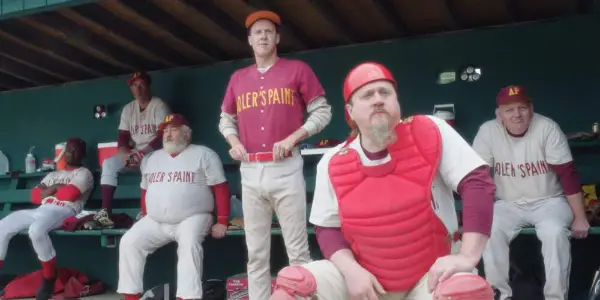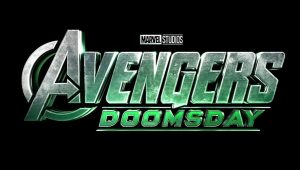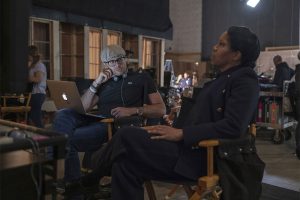
If you asked me what I wanted to be when I grew up, at 5 years old, I would have said, “A baseball player.” A few years into a Little League career I probably already knew I would never make it, but even if you leave baseball, when you’re introduced to it early, baseball never leaves you.
It doesn’t need to be a career if it’s a part of your life. There’s something elemental about it even to this day. So much about the game’s tradition and the mundane rhythms and repetitions are indicative of the human experience. It’s a game about time, and it uses time in ways few other sports can match.
Ironically, the Major Leagues have tried to speed up the game with the pitch clock and other mechanisms during extra innings for the modern audience. I’m not here to critique the changes, and I see the upside. However, even with the changes, there are still nine innings with no limitation besides humility fallibility. We strike out, and we make errors.
Carson Lund‘s Eephus is a movie about the essence of a game that can conceivably be played for eternity. Sometimes it feels like it is. Perhaps this sounds like hell for some spectators sitting frostbitten in the cold or heaven for those with fond memories of playing with their buddies. Context is everything.
The Eephus Pitch
For the uninitiated, the eephus pitch is lobbed at the plate in a high arch, but it also functions as a kind of quirky metaphor for “baseball time.” The Greeks gave us chronos (quantitative) and kairos (qualitative) time, so it’s too bad they didn’t play baseball too.
source: Music Box Films
I remember going to an independent pro game a few years back. Anytime someone hit a home run, someone else would oblige and pass around the hat for tips. It was a far cry from the Big Leagues, but you keep on playing because you love the game.
The teams featured in Eephus are even humbler. We don’t know much about them except their names are the Riverdogs and Adler’s Paint. It gives you a good idea of where we are within the New England milieu.
Some of the players look more athletic than others as they guzzle beer and trade smack; this is their final game as a rec league. Their local field is being demolished for the construction of a new school. The movie’s structure is built around the innings of the game, and if there’s a ticking clock, then it’s the impending finality. We know the game will end… eventually.
Initially the only onlooker is also the self-enlisted scorekeeper and historian dropping a steady stream of aphorisms from the likes of Lou Gehrig and Yogi Berra. Franny (Cliff Blake) partakes in the time-honored tradition of keeping score by hand and becomes the impromptu umpire when their ump goes home on account of darkness. Appearances by the likes of Bill “Spaceman” Lee, Frederick Wiseman, and Joe Castiglione almost feel incidental — like nods to the localized community atmosphere.
Baseball Is More Than A Game
Men often need a shared activity or goal to galvanize them. I don’t always relate. However, I realize now since my sporting days are mostly behind me, there is something absent when you don’t have the camaraderie of the team — people you know have your back and that you have developed shorthand with through shared experience.
As alluded to earlier, I played baseball for a time and was decent, but as I grew older I would have been the guy behind the centerfield fence playing soccer with free-flowing abandon. Baseball is a very different sort of game.
Still, as a lover of history and someone often reverent of tradition, baseball remains near and dear to my heart because whatever happens, it still feels like America’s game. It was there before anything else. Watching it, you’re reminded that its history runs deep; it feels like childhood and echoes our daily human experience.
Baseball is not just a game, just like Eephus is not just about playing a game. It is a conduit for so much more. I don’t feel like I need to speak to this at length here. Men are not always good at expressing themselves, but surely most viewers can intuit what is happening. These men want to give their field the best sendoff they can, and they do so communally. As humans, we desire the bang and not the whimper. We want a good ending.
There’s one moment where a player walks back to the dugout dejected. His wife and kids are going home to have dinner. He bemoans the fact that this might be the last at-bat of his they ever witness, and it was a clunker. His pragmatic teammate tries to encourage him; they’re too young to remember. Except his kids are 10 and 12.
source: Music Box Films
It might seem dumb, but I understand the immense desire to have control of how you go out. In 6th grade, I still remember I went a sweltering 8 for 11 in the playoffs with one strikeout, one line-out, and one RBI groundout.
In my final at-bat, I hit a double in the gap — the go-ahead run helping us win the championship. I sunset my baseball career that day when I was 12 years old. Somehow I never regretted the decision. Because for me the ending was as satisfying as endings can be. And to be clear: Compared to the ball players of Eephus, my Little League stats mean peanuts, and yet I still remember them.
Franny parrots Lou Gehrig’s speech again (“Today I consider myself the luckiest man on the face of the earth!”) and then echoes the line of Simon & Garfunkel’s “Mrs. Robinson” under his breath: “Where did we go, Joe DiMaggio?” There’s always a wistful nostalgia to the lyric. A way of life or at least a part of life is disappearing, and we watch the headlights go out in front of us as everyone picks up and heads their separate ways.
Conclusion
I’m convinced baseball is a beautiful game because it mirrors this beautiful life, and it’s not just about the exciting bits. I’ve seen brawls, walk-off grand slams, and ambulances on the field. But I remember the minor things just as well. Shelling peanuts, singing “Take Me Out to the Ballgame,” playing catch with my dad, eating a hot dog. I’ve done them too many times to count. They all blend together, and yet there’s a comfort in them — an inevitability. There’s also something ineffable as we travel across the base paths, leaving home and simultaneously longing to return there. It’s the core metaphor of the game.
This is just some of what baseball means to me, and the fact that Eephus managed to access just a sliver of this still makes it a success. Because we all know the game will end, and the lights will go off and that will be the end of it. It’s what we make of it on our way home that matters. Baseball, like life, is a team sport played across time. We can’t do it alone. Nor would we want to.
Eephus is currently playing in theaters.
Does content like this matter to you?
Become a Member and support film journalism. Unlock access to all of Film Inquiry`s great articles. Join a community of like-minded readers who are passionate about cinema – get access to our private members Network, give back to independent filmmakers, and more.











